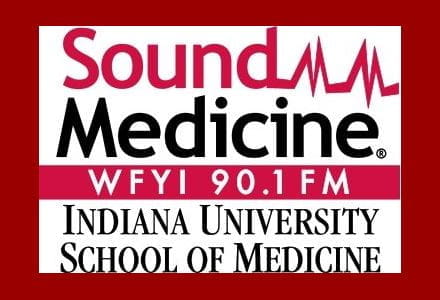INDIANAPOLIS — The “Sound Medicine” program for June 1 features segments covering cardiovascular disease, a new test for HPV, and the scoop on free drug samples.
Can sugar cause heart disease? A recent study published in The Journal of the American Medical Association found that consuming added dietary sugar increased the risk of death from cardiovascular disease. The World Health Organization and American Heart Association recommend that adults limit their sugar intake to 100 calories from sugar per day or less than 10 percent of all caloric intake. Rachel Johnson, Ph.D., MPH, R.D., comments on the recent study, why Americans take in more sugar than they should and how people can cut their sugar intake. Dr. Johnson is a professor of nutrition at the University of Vermont.
Can cardiovascular disease be prevented? John Kennedy, M.D., the director of preventive cardiology and wellness at Marina Del Ray Hospital, recently published “The Heart Health Bible,” which is dedicated to preventing cardiovascular disease. The book describes a five-point plan focusing on blood pressure, energizing the heart, acting on fat, reducing blood sugar and tackling triglycerides. Dr. Kennedy discusses his book and what listeners can start doing now to prevent cardiovascular disease.
Could a new HPV test change cervical cancer screenings? In April, the FDA approved the use of a new human papillomavirus test for primary cervical cancer screening. The HPV DNA test, which detects the genetic material of the 14 high-risk strains of HPV, is approved for women over 25 and determines whether a woman needs further testing for cervical cancer. Aaron Ermel, M.D., an assistant professor of clinical medicine at the IU School of Medicine, joins “Sound Medicine” to discuss the newly approved test, the reasons it should not be used in women under 25 and the impact this test will have on cervical cancer screenings in the future.
Who do free drug samples benefit, patients or manufacturers? According to a study published in the journal JAMA Dermatology, free pharmaceutical samples benefit drug manufacturers and encourage doctors to prescribe high-cost name-brand pharmaceuticals as opposed to low-cost generic drugs. Eric Meslin, Ph.D., discusses why free drug samples may not save patients money in the long run.
Are legal ramifications for physician-assisted suicide changing? David Orentlicher, M.D., J.D., is the lead author of “The Changing Legal Climate for Physician Aid in Dying,” which traces the legalities of physician aid in dying throughout history as well as current end-of-life laws. According to the article, “What is critical about the right (to take life-ending action) is the desire to protect seriously ill people from intolerable suffering.” Dr. Orentlicher discusses the article and why many states may begin allowing physician aid in dying.
“Sound Medicine” covers controversial ethics topics, breakthrough research studies and the day-to-day application of recent advancements in medicine. It’s also available via podcast and Stitcher Radio for mobile phones and iPads and posts updates on Facebook and Twitter.
Co-produced by the IU School of Medicine and WFYI Public Radio (90.1 FM) and underwritten in part by Indiana University-Purdue University Indianapolis, “Sound Medicine” airs on the following Indiana public radio stations: WBSB (Anderson, 89.5 FM), WFIU (Bloomington, 103.7 FM; Columbus, 100.7 FM; Kokomo, 106.1 FM; Terre Haute, 95.1 FM), WNDY (Crawfordsville, 91.3 FM), WVPE (Elkhart/South Bend, 88.1 FM), WNIN (Evansville, 88.3 FM), WBOI (Fort Wayne, 89.1 FM), WFCI (Franklin, 89.5 FM), WBSH (Hagerstown/New Castle, 91.1 FM), WFYI (Indianapolis), WBSW (Marion, 90.9 FM), WBST (Muncie, 92.1 FM), WBSJ (Portland, 91.7 FM), WLPR (Lake County, 89.1 FM) and WBAA (West Lafayette, 101.3 FM).
“Sound Medicine” is also broadcast on these public radio stations across the country: KSKA (Anchorage, Alaska), KTNA (Talkeetna, Alaska), KUHB (Pribilof Islands, Alaska), KUAF (Fayetteville and Fort Smith, Ark.), KIDE (Hoopa Valley, Calif.), KRCC (Colorado Springs, Colo.), KEDM (Monroe, La.), WCMU (Mount Pleasant, Mich.), WCNY and WRVO-1 (Syracuse, N.Y.), KMHA (Four Bears, N.D.), WYSU (Youngstown, Ohio), KPOV (Bend, Ore.), KEOS (College Station, Texas), HPPR (High Plains Public Radio), which includes: KCSE (Lamar, Col.), KZNK (Brewster, Kan.), KZCK (Colby, Kan.), KZNZ (Elkhart, Kan.), KZAN (Hays, Kan.), KZNA (Hill City, Kan.), KGUY (Guymon, Okla.), KJJP (Amarillo, Texas), KTXP (Bushland, Texas), KTDH (Dalhart, Texas), KTOT (Spearman-Perryton, Texas).
Please check local listings for broadcast dates and times.




